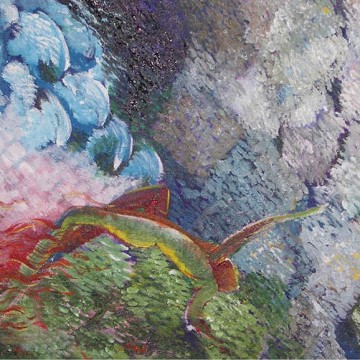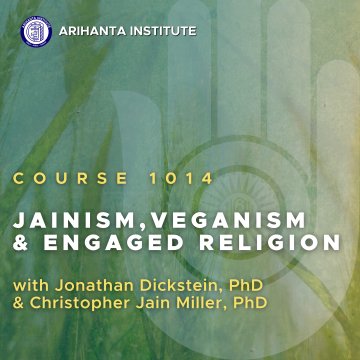Jainism, Veganism, and Engaged Religion
Course Intro Video


Jainism, Veganism, and Engaged Religion
Course 1014
Committed to nonviolence (ahiṃsā) since its ancient beginnings, the Jain tradition has admonished the mistreatment, slaughter, sacrifice, and consumption of animals for thousands of years. In light of these commitments, Jains have traditionally lived a lacto-vegetarian lifestyle, advocated for the legal protection of animals, and have created sanctuaries for animals for centuries. In ancient and medieval scriptural sources, we even find restrictions on the consumption of dairy itself, suggesting potential pre-modern Jain commitments to what would now be referred to as a vegan lifestyle. And today, many Jains have been advocating for veganism in light of the devastating and irreparable harms involved in the production of dairy in contemporary society.
This course carefully considers the philosophical and historical underpinnings of Jain Veganism, presenting an opportunity for non-Jain vegans to discover a rich philosophical system aligned with their values, as well as an opportunity for Jains to appreciate the philosophical resources within their own tradition which naturally lead to living an ethical vegan lifestyle.
Course Details
- 6 hours of recorded lecture content
- Additional readings for self-study
- Plus+ 4 x 60-minute recorded Q&A sessions with Professors Dickstein and Miller
Student Reviews
- "Arihanta Institute's course, Jainism, Veganism, and Engaged Religion, is a remarkable example of the transformative power of aligning nonviolence, or ahimsa, with daily living. Professors Miller and Dickstein expertly highlight the Jain tradition, sparking essential conversations about animal agriculture, spiritual practice, and ethically navigating climate collapse. If you're seeking a compassionate path forward, I highly recommend this course. Every week brought a welcoming dialogue with our cohort of students and additional insights from our professors. Thank you, Arihanta Institute!"— Diana H., United States, 2024
- “This course exceeded my already-high expectations. Thank you all from the bottom of my heart.”— Agni H., United States, 2024
- "I have enjoyed this class, the readings and videos, our discussions, and the meetings with all of you. Thank you all and thank you for this offering Christopher and Jonathan."— Mike A., United States, 2024
Learning Area
 Jain Philosophy, History & Anthropology
Jain Philosophy, History & Anthropology  Climate Change & Environment
Climate Change & Environment  Animal Advocacy & Biodiversity
Animal Advocacy & Biodiversity Instructors
 Jonathan Dickstein, PhD
Jonathan Dickstein, PhD
Jonathan Dickstein, PhD, the Tirthankara Shreyansanath Endowed Assistant Professor of Jain and Vegan Studies at Arihanta Institute, specializes in South Asian Religions, Religion and Ecology, and Comparative Religious Ethics. He received his doctoral degree in Religious Studies from the University of California, Santa Barbara, where he wrote his dissertation on ancient Indian animal taxonomies and their relevance for religious ritual and dietary practice. Jonathan’s current work focuses on Jainism and contemporary ecological issues, and accordingly extends into Critical Animal Studies, Food Studies, and Diaspora Studies.
Jonathan has published in a wide array of interdisciplinary journals on topics such as veganism and politics, yoga and diet, Jain veganism, and the ethic of nonviolence (ahiṃsa). Jonathan considers himself a scholar-practitioner, having spent many years not only in libraries but also in public advocating for justice for both humans and nonhumans alike.
Jonathan has published in a wide array of interdisciplinary journals on topics such as veganism and politics, yoga and diet, Jain veganism, and the ethic of nonviolence (ahiṃsa). Jonathan considers himself a scholar-practitioner, having spent many years not only in libraries but also in public advocating for justice for both humans and nonhumans alike.
 Christopher Miller, PhD
Christopher Miller, PhD
Christopher Jain Miller, the co-founder and Vice President of Academic Affairs at Arihanta Institute, completed his PhD in the Study of Religion at the University of California, Davis. He is Professor of Jain and Yoga Studies at Arihanta Institute, Visiting Researcher at the University of Zürich's Asien-Orient-Institut, and Adjunct Professor at Claremont School of Theology. Christopher's primary fields of research interest are Yoga Studies and Engaged Jain Studies, and he currently serves as the co-chair of the Yoga in Theory and Practice Unit at the American Academy of Religion as well as on the steering committees for the Dharma Academy of North America (DANAM) and the Yoga Darśana Yoga Sādhana conference. Christopher is the author of Embodying Transnational Yoga: Eating, Singing, and Breathing in Transformation (Routledge 2024) and the co-editor of Engaged Jainism: Critical and Constructive Studies of Jain Social Engagement (SUNY 2025) as well as Beacons of Dharma: Spiritual Exemplars for the Modern Age (Lexington 2020).
Enrollment Options
14-DAY FREE TRIAL
- Free, unlimited access to our self-paced courses for 14-days.
- Already used your free trial? Enroll in our Monthly or Annual Membership options at anytime and continue learning immediately!
MONTHLY MEMBERSHIP
- $45 USD / Month
-
Immediate access to course
#### | Name. - Unlimited access to our live and self-paced courses for one month, with month-to-month auto rollover.
- Excludes graduate seminars, language courses, and courses hosted on partner platforms.

